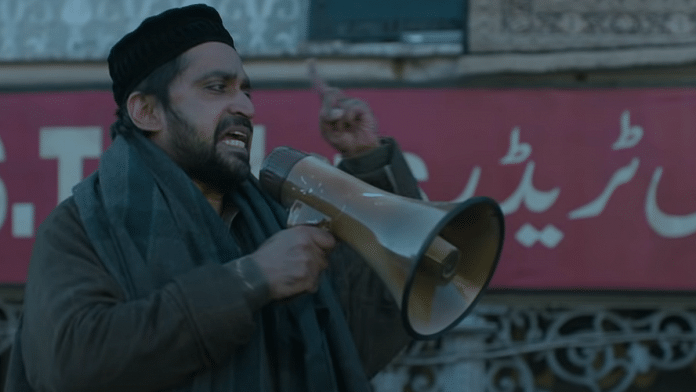Disturbing and discomforting are the two words that best describe the cinematic experience of The Kashmir Files directed by Vivek Agnihotri. The director opens a black chapter of Kashmir’s history – the 1990 exodus of lakhs of Kashmiri Pandits during the peak of terrorism in the state. While this might not be the first movie on the exodus, the story is brought out in a way that you agree, disagree, hate, connect and get angry with it at different times — to be fair, it grasps your attention through and through.
The story revolves around Krishna Pandit (Darshan Kumar), a ‘JNU student’, who thinks his parents were killed in an accident as told by his grandfather, Pushkar Nath (Anupam Kher). But the truth is more depressing. He is caught in the middle of two opposing narratives of the Kashmiri Pandit exodus of 1990. One side is represented by the pro-Azaadi JNU professor (Pallavi Joshi) who is gaining a lot of support on the campus for her ‘Kashmir cause’. On the other side is Nath, who has been struggling for 30 years to get justice for the exodus, which the professor claims is a sham.
After Pushkar Nath’s death, Krishna goes back to Kashmir to fulfil his last wishes and also meets four of Nath’s friends – a journalist, a doctor, a former police officer, and a retired civil servant. They are shocked to know that Krishna didn’t know the true story of his father’s death.
The Kashmir Files then becomes a journey of discovering the truth for Krishna. In one among many traumatic scenes, Krishna’s father, hiding in a container of rice, is killed by a local terrorist. His mother is forced to eat the blood-soaked rice from the same container. It is also a story that is loosely based on B.K. Ganjoo, an engineer killed in 1990 in the valley, according to various media reports.
Also read: Maaran has a script so wobbly even Dhanush can’t save it
Mingling facts with fiction
However, what many call a ‘well-researched’ story starts to play with the truth hereon. Vivek Agnihotri called the film “truth of Kashmir ” and rightly shows the infamous Nadimarg massacre of 2003 when 24 Kashmiri Pandits were reportedly killed. But he wrongly puts out the fact that Mrs Ganjoo was also killed at the same time.
Dark moments like the killing of four Indian Air Force officers by JKLF (Jammu Kashmir Liberation Front) members and 19 January 1990 — when the exodus took place — are brought to light.
In the movie, one terrorist is involved – inspired by Yasin Malik and Farooq Ahmed Dar (also known as Bitta Karate) of the JKLF. Bitta, played by Chinmay Mandlekar, had confessed on camera that he killed 20 Kashmiri Pandits in the 1990s. But Agnihotri’s ‘truth’ shows his involvement in the Nadimarg massacre, which had actually involved another terrorist called Zia Mustafa of an altogether separate terrorist organisation.
Also read: Hotstar’s Rudra is tailored to fit Ajay Devgn’s persona. But its villains steal the show
‘Death blow’ to credibility
There is no softer way to put it – The Kashmir Files, through and though, is trying to defame JNU, portraying it as an anti-national, terror-friendly institute. Somehow, Vivek Agnihotri also manages to bring up Article 370 in order to connect it with the exodus. The movie almost blames it to be one of the reasons for the displacement of Kashmiri Pandits.
The Kashmir Files also tries to pin the blame on Farooq Abdullah and the Rajiv Gandhi-led government in Delhi. During the exodus, V.P. Singh was the prime minister, but the blame is pinned on Home Minister Mufti Mohammad Sayeed. Similarly, it portrays that it is the terrorists who try to provoke Krishna to go against Prime Minister Narendra Modi as well.
Some events like showing that only Kashmiri Hindus were killed in 1990 are insensitively portrayed despite the fact that people across religions suffered during the peak of terrorism in the state. The movie almost promotes the cause of Islamophobia at one point. In the last scene showing the Nadimarg Massacre where Krishna’s mother and his younger brother are killed, I could hear a voice in the audience that said, “Ye poori qaum hee aisi hai (This whole race is the same).”
While The Kashmir Files brings out the truth and the much-needed story of Kashmiri Pandits, it tanks its credibility by mingling with facts, defaming JNU, blaming selective politicians, and ignoring the rest of the period of unrest in the late 1980s and early 1990s in Kashmir. It could have been a stunning tribute to the cause, but Agnihotri’s personal opinions give the film and its credibility a death blow.
(Edited by Humra Laeeq)



